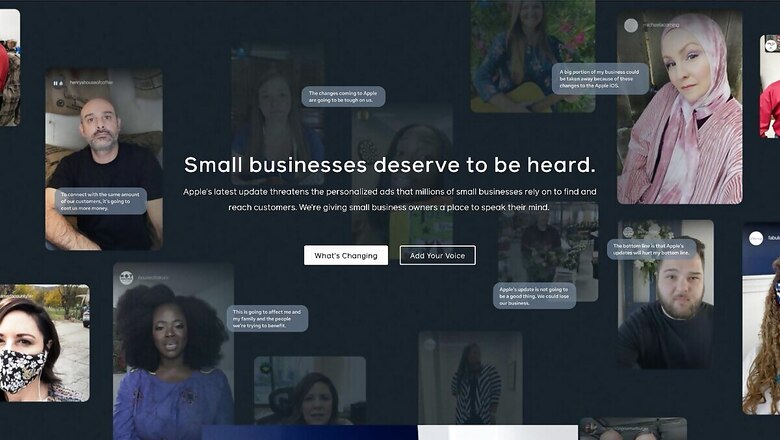
views
The Facebook vs Apple saga is turning into a bit of a PR nightmare for the social media giant. Quite the opposite of how Facebook would have envisioned it when it decided to be seen championing the cause of small businesses around the world. In a series of advertisements on multiple mediums, including print media in the US, Facebook embarked on a war against Apple’s upcoming privacy policy with iOS 14 for iPhone users. At the center of the argument is the App Tracking Transparency feature that will bring to the forefront a control that would allow users to stop apps from tracking them across apps and websites on their iPhone or iPad. Facebook isn’t happy, which is quite perplexing. Now as it turns out, even Facebook employees do not believe Facebook is really standing up for small businesses and are calling the criticism of Apple’s privacy push as hypocrisy.
This is how it started. The way the App Tracking Transparency feature will work is that when you open an app on your iPhone, for the first time or after an update, you will be asked, “Allow XYZ to track your activity across other companies’ apps and websites?” The two options you will have at this stage would be “Ask App not to Track” or “Allow”. The change was expected to be rolled out with the iOS 14.3 update that was released earlier this month, but Apple delayed it till early next year for a wider release to allow app developers more time to prepare. The App Tracking Transparency feature will be part of the Privacy menu in the Settings app. An iPhone user will now be able to choose whether they want to allow or deny an app from tracking their browsing and app usage trends.
The idea is simple—disclosure and choice. The lack of disclosure and choice is what Facebook has bet heavily on over time, tracking what you browse for, shop for and use apps for, on your phone, tablet, PC and pretty much any computing device in your workflow. How else do you think you’d get those uncannily well-targeted ads just at the right time on your Facebook or Instagram feed? The new privacy measures will apply to all apps on your iPhone and on the Apple App Store.
Apple has simply said that the new feature does not require Facebook to change its business model or approach to collecting user data to serve personalized ads, it just needs to seek permission and be transparent about the data being collected. This will be true for all Facebook apps, including Instagram. “We believe users should have the choice over the data that is being collected about them and how it’s used. Facebook can continue to track users across apps and websites as before, App Tracking Transparency in iOS 14 will just require that they ask for your permission first,” Apple CEO Tim Cook said in a tweet.
The tweet came as a response to what looks like an emotional plea for the cause of small businesses around the world, as part of Facebook’s “Speak Up for Small Businesses” campaign. One newspaper advert reads, “Apple plans to roll out a forced software update that will change the internet as we know it—for the worse. Take your favorite cooking sites or sports blogs. Most are free because they show advertisements. Apple’s change will limit their ability to run personalized ads. To make ends meet, many will have to start charging you subscription fees or adding more in-app purchases, making the internet much more expensive and reducing high-quality free content.”
Well, no. None of this would happen as Facebook’s internet doomsday scenario is being sold to users. All that will change is that Facebook and other apps will not be able to track you as you travel the world wide web, unless you give them specific permission to do so. Till now, they never really sought any permission or consent. It is also interesting how Facebook seems to be talking this up as a social cause and doesn’t really talk about how they have collected data so far and how the stricter privacy requirements impact them.
The highlight element of this PR disaster has to be that Facebook employees are calling out their company’s hypocrisy around this stunt. A scathing report by Buzzfeed News suggests that some employees believe this is a “self-serving campaign that bordered on hypocrisy”. It is reported that Facebook intends to have an internal conversation with employees about the expected changes in their business model, but the most popular questions being upvoted for discussion revolve around the concerns of what this PR campaign will do for the image of Facebook. “People want ‘privacy. FB objecting here will be viewed with cynicism. Did we know this would be bad PR, & decide to publish anyway?” is one example. That tells you a lot.
There is reportedly another post by another Facebook employee on the company’s internal message boards, around the privacy discussions. The message reads, “The only thing I’m hearing, again and again, is ‘this is bad for the businesses,’ and I’d really like someone at the top to explicitly say, ‘People are better off if they don’t know what we’re doing, if we don’t have to explain ourselves to them, if they don’t get a choice to opt in or opt out of our practices, if we obscure it as much as possible behind interesting features and then get them to accept surreptitious tracking on the back end as long as we downplay it.” Doesn’t it pretty much sum up what Facebook has been doing all this while?
A little bit of history here. It was in 2018 that Tim Cook had pointed out how Facebook was profiting from its users’ data, while speaking at a town hall event hosted by MSNBC’s Chris Hayes and Recode’s Kara Swisher. When asked what he would do if he were in Zuckerberg’s position, Cook replied: “What would I do? I wouldn’t be in this situation.” Mark Zuckerberg had hit back, saying, “You know, I find that argument, that if you’re not paying that somehow we can’t care about you, to be extremely glib. And not at all aligned with the truth. The reality here is that if you want to build a service that helps connect everyone in the world, then there are a lot of people who can’t afford to pay.” This was at a time when Facebook was facing criticism for the Cambridge Analytica data scandal.
Read all the Latest News, Breaking News and Coronavirus News here













Comments
0 comment